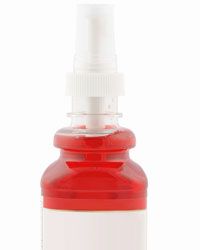It's scratchy, tender and swollen, and you dread the simple task of swallowing. But you must swallow, and when you do, you brace yourself for the unavoidable pain.
If you've got a sore throat, you're in good company; everybody gets them, and 40 million people trek to the doctor's office for treatment every year.
Advertisement
The mechanics of a sore throat are pretty simple. It's an inflammation of the pharynx, which is the tube that extends from the back of the mouth to the esophagus. The leading causes of your discomfort are:
- Viral infections, like colds or the flu. Often accompanied by fever, achy muscles and runny nose, viral infections can't be cured, but their symptoms can be treated. A sore throat from a viral source will generally disappear on its own within several days.
- Bacterial infection, especially from streptococcal bacteria (strep throat). Symptoms are much like those of a viral infection but may be more severe and long lasting. Often a bacterial infection is accompanied by headache, stomachache and swollen glands in the neck. A strep infection is generally treated with antibiotics because permanent heart or kidney damage can result. Culturing the bacteria is the only way a doctor can determine the cause of the sore throat.
While those are the primary reasons for a sore throat, there are others, including:
- Smoking
- Acid reflux
- Allergies
- Dry air, especially at night when you may sleep with your mouth open
- Mouth breathing
- Throat abuse: singing, shouting, coughing
- Polyps or cancer
- Infected tonsils
- Food allergy
A sore throat can be a minor but annoying ailment, or it can be a symptom of a serious illness. Causes range from a stuffy nose or a cold to strep throat, a bacterial throat infection caused by Streptococcus pyogenes. Since untreated strep throat can lead to rheumatic fever and scarlet fever, it's important to get medical help as early as possible into the illness. Along with producing severe soreness in your gullet, strep throat may be accompanied by fever, body aches and pains and malaise.
If you have these symptoms, or if you have a sore throat lasting more than two or three days, it makes good sense to see a doctor. For mild sore throats that accompany a cold or allergy, there are soothing remedies using common household items that can stand alone or work side by side with traditional medicine to stifle that soreness. Get started with the first home remedy on the next page.
This information is solely for informational purposes. IT IS NOT INTENDED TO PROVIDE MEDICAL ADVICE. Neither the Editors of Consumer Guide (R), Publications International, Ltd., the author nor publisher take responsibility for any possible consequences from any treatment, procedure, exercise, dietary modification, action or application of medication which results from reading or following the information contained in this information. The publication of this information does not constitute the practice of medicine, and this information does not replace the advice of your physician or other health care provider. Before undertaking any course of treatment, the reader must seek the advice of their physician or other health care provider.

















